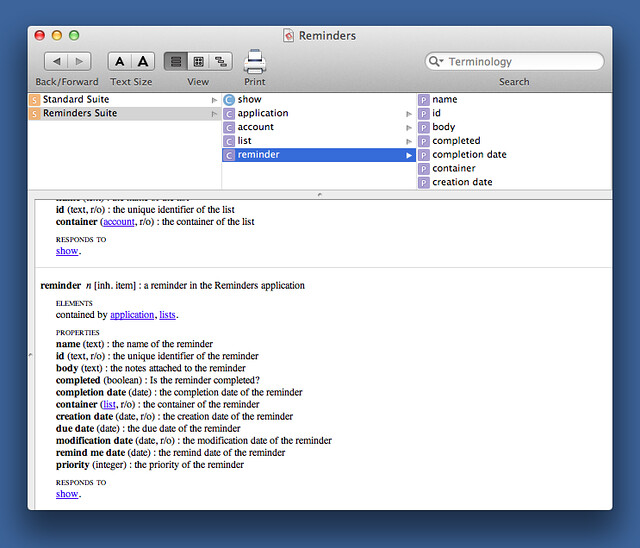Mixed AppleScript signals
October 23, 2013 at 10:08 PM by Dr. Drang
I woke up this morning to find this overnight tweet from Clark Goble in my Twitter stream:
@drdrang. I’m so upset. Apple dropped Applescript support on nearly all their apps today. bit.ly/1gDNT6D
— Clark Goble (@ClarkGoble) Wed Oct 23 2013 12:22 AM CDT
He sent essentially the same tweet to several people. The post he linked to (which is not available as I write this, probably because it’s getting a lot of traffic) detailed what he found—or, more accurately, didn’t find—when he looked in the AppleScript dictionaries of the new OS X iWork applications that were announced yesterday. What Eddy Cue called a “ground-up rewrite” of the applications didn’t include AppleScriptability. Well, I guess you can’t blame the developers; they only had four years to work on it.
This has very little direct effect on me. I don’t use Pages unless I need to quickly make a short one-off document with lots of odd formatting, which happens about once every 2–3 years. I’ve used Keynote even less. I use Numbers for a few very simple financial things at work because it can make nice looking output, but I’d never use it for serious calculations or graphing because it doesn’t handle large amounts of data well.
But even though I don’t need scriptability in these applications the way Clark and others do, that doesn’t mean I’m not concerned about its disappearance. There once was a time when Apple touted the Mac’s automation capabilities, but those days are a distant memory. I dislike AppleScript intensely, but it’s often the only way to get the computer to work for me instead of the other way around, so I’d be terribly disappointed if it went away with nothing to replace it.
The weird thing is that before Clark’s tweet I was feeling a little more optimistic about AppleScript. During my struggles with location-based Reminders, I learned that Reminders has a halfway decent AppleScript dictionary, a surprise for a relatively recent application from Apple.
In addition, this description of AppleScript’s use clause—new in Mavericks!—and this further discussion of Mavericks’ improvements in the AppleScript language itself tell us that AppleScript is still being actively developed.
But improvements in the AppleScript language itself are like the proverbial tree falling in a forest. If no applications bother to use AppleScript, do those improvements exist? Not in any practical sense. No one in their right mind uses AppleScript as a standalone language; it’s all about adding functionality to an app or acting as glue between apps.
How can Apple be making improvements in AppleScript on one hand and stripping AppleScript from iWork on the other? Despite Apple’s well-deserved reputation for tight control of its employees, it’s always allowed its internal developers a surprising degree of freedom. Often that freedom has led to applications that Apple would frown upon if they came from outside. When you see an application that’s wildly at variance with the Human Interface Guidelines, it’s almost always from Apple. Think of GarageBand, iTunes, and Address Book. Going back to earliest days of the Mac, both MacPaint and HyperCard took over the whole screen because Bill Atkinson was given the freedom to make them that way.
Sometimes this works out well for users, sometimes it doesn’t. My guess is that the iWork team wanted the OS X versions to be as much like the iOS and web app versions as possible, and AppleScript would have been a big fork in both functionality and the code base. So they dumped it, and to hell with Clark and the others who relied on it to get their work done.
In theory, this opens a hole that other developers could fill. Other word processors for the Mac already exist, so there must be something that Pages wasn’t providing. Now there’s even more.
As for spreadsheets and presentation software, the only competition I’m aware of is Excel and PowerPoint from the MS Office suite. I’ve never used PowerPoint and haven’t used Excel in almost 20 years, but David Sparks says their AppleScript support was better than iWork’s even before the purge. Now Apple is essentially pushing its power users toward Microsoft. It’s a funny world.

